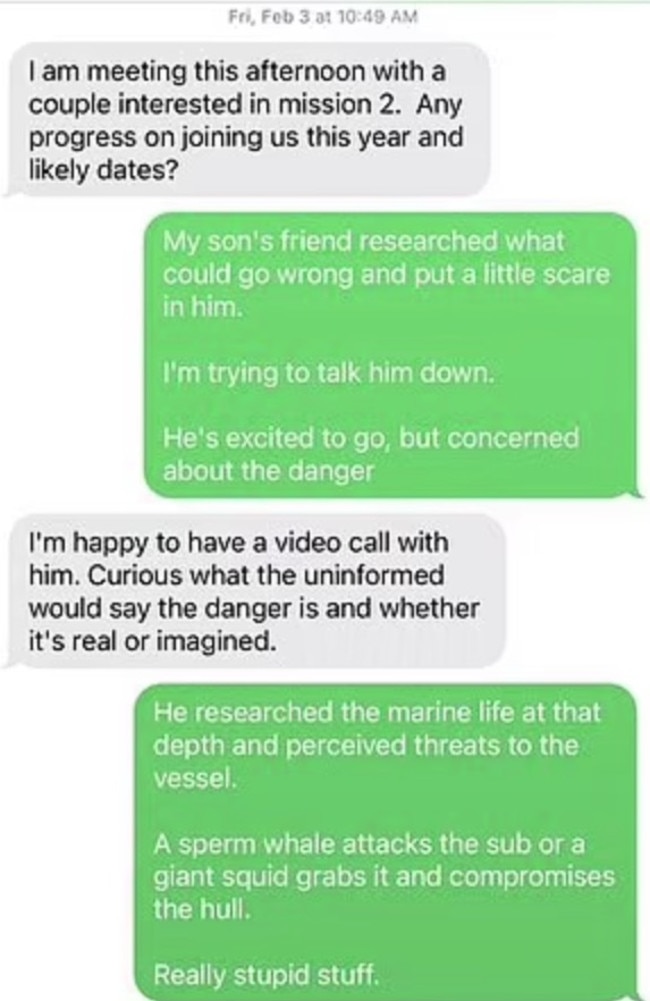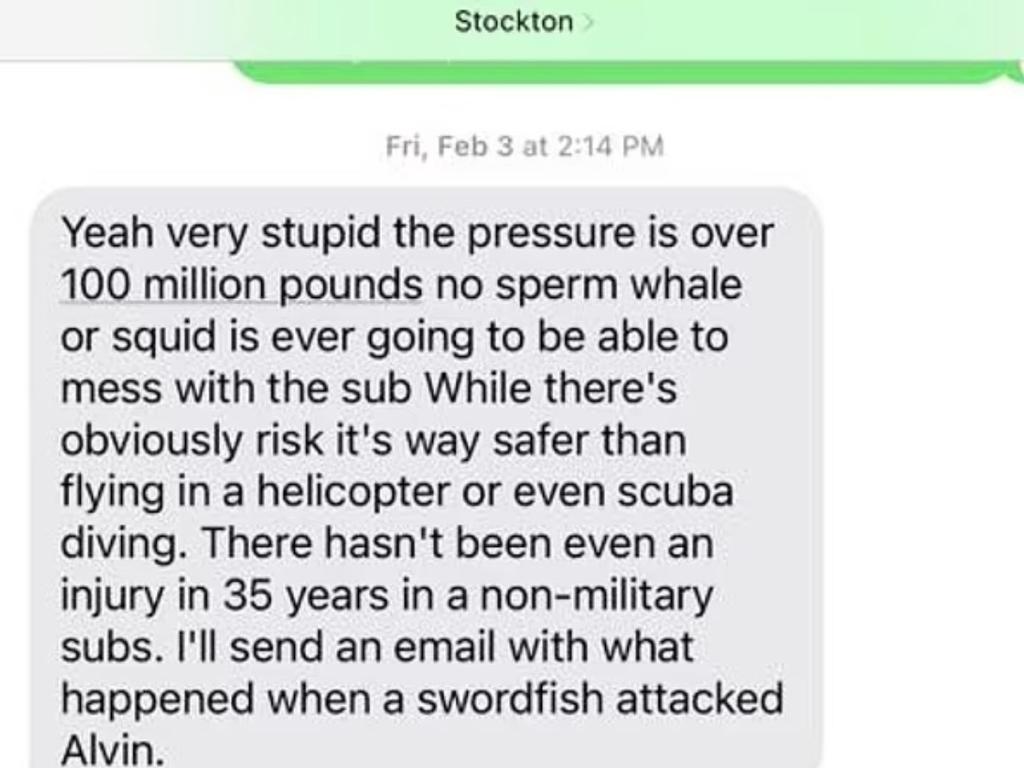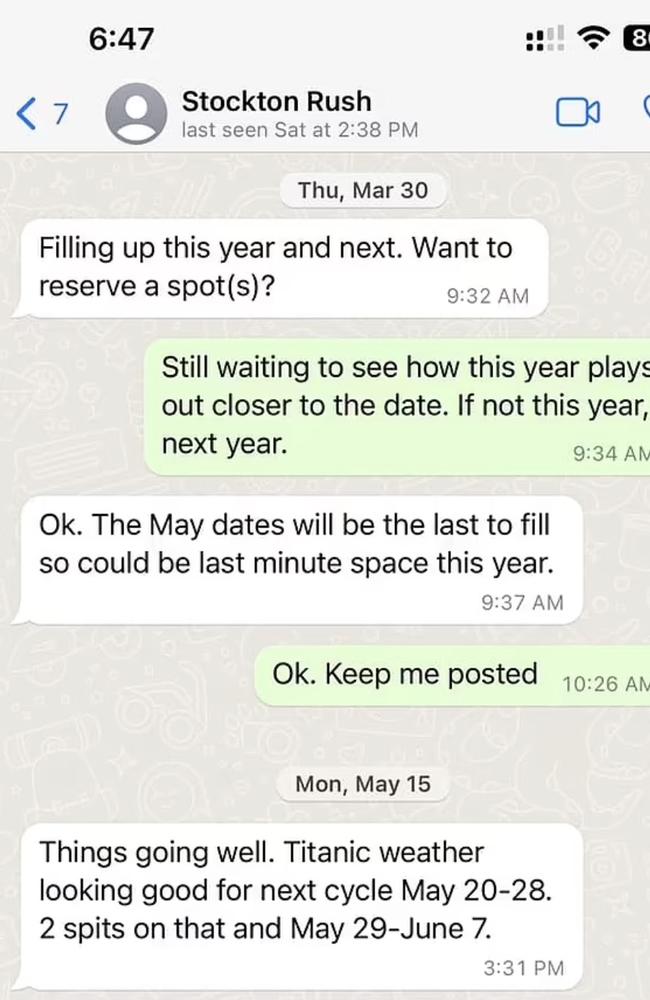
This article is more than
2 year oldA wealthy Las Vegas financier has revealed the shocking text messages sent to him by the CEO of OceanGate, who believed his submarine was “safer than crossing the street”.
Jay Bloom had declined discounted tickets for the ill-fated trip on the company’s doomed sub citing safety concerns.
He received messages from Stockton Rush, who tragically died on Titan after it imploded on Sunday morning, saying his vessel was safer than scuba diving.
Bloom made the messages public in a Facebook post after it was revealed that five people on board Titan had died.
The messages revealed that Bloom and his son were offered a last-minute price of $150,000 per person, a reduction from the usual fee of $250,000.
He recounted his interaction with Rush regarding safety concerns, quoting Rush as saying, “While there‘s obviously risk – it’s way safer than flying in a helicopter or even scuba diving.”
Bloom had informed Rush earlier that scheduling constraints prevented him from joining the dive until the following year.
Consequently, the available seats were allocated to Shahzada Dawood, Suleman Dawood, and Hamish Harding, who tragically lost their lives during the ill-fated expedition.
Throughout their conversation, Rush attempted to reassure Bloom regarding the safety measures in place aboard the Titan and during the journey to the Titanic‘s wreck.


Bloom mentioned that his son expressed concerns after discussing the risks with a friend.
In response, Rush offered to have a video call to address any concerns and questioned whether the perceived danger was real or imagined by the “uninformed”.
Among the topics they discussed were how the hull would withstand pressure and the possibility of encountering marine life such as whales or squids. Rush reiterated his belief that the trip was significantly safer than activities like helicopter flights or scuba diving.
He also highlighted that there hadn’t been “any injuries in non-military submarine dives for the past 35 years”.


“In February Stockton asked me and my son, Sean, to go with him on the dive to Titanic in May. Both May dives were postponed due to weather and the dive got delayed until June 18th, the date of this trip,” Bloom shared in a Facebook post.
“I am sure he really believed what he was saying. But he was very wrong.
“He passionately believed in what he was doing.
“The last time I saw Stockton in person was March 1st. He took me through the Titanic Exhibit at Luxor. Then, at lunch in the Luxor food court we talked about the dive, including safety. He was absolutely convinced that it was safer than crossing the street.”
It came after star filmmaker James Cameron labelled the rescue mission “futile” after revealed that he was told on Monday it had imploded.


The 68-year-old sea expert said he was informed there was a noise that sounded like the OceanGate vessel imploding after it had lost communication with its mothership.
His explosive claims were aired during an interview with veteran journalist Anderson Cooper on CNN on Friday.
“I’ve been living with it for a few days now, as have some of my colleagues in the deep submergence community,” he said.
“I tracked down some intel that was probably of a military origin, although it could have been research – because there are hydrophones all over the Atlantic – and got confirmation that there was loud noise consistent with an implosion.”
While he wasn’t shocked by the news, the director – who has travelled down to the wreckage of the historic ship several times – said he still felt “heart sick from the outcome”.

“I‘ve been living with it for a few days now, as have some of my colleagues in the deep submergence community,” he said.
“I was out on a ship myself when this happened on Sunday.
“The first I heard of it was on Monday morning. I immediately got on my network – because it’s a very small community in the deep submergence group – and found out some information with about a half-hour that they had lost comms and they had lost tracking simultaneously.
“The only scenario that I could come up with in my mind that could account for that was an implosion. A shockwave event so powerful it actually took out a secondary system that has its own pressure vessel and its own battery power supply, which is the transponder that the ship uses to track where the sub is.”